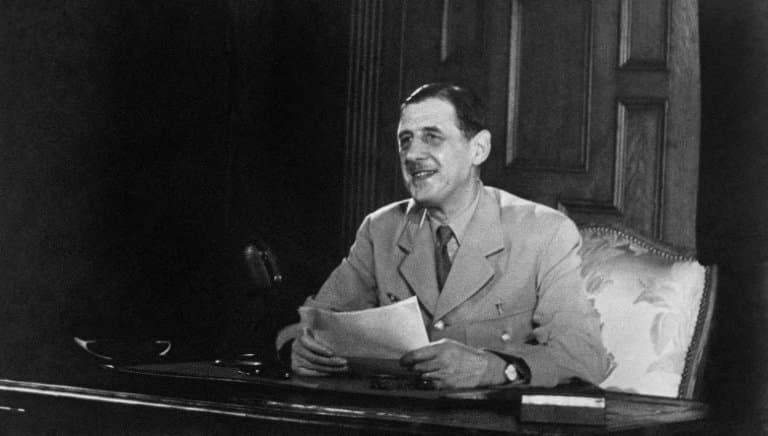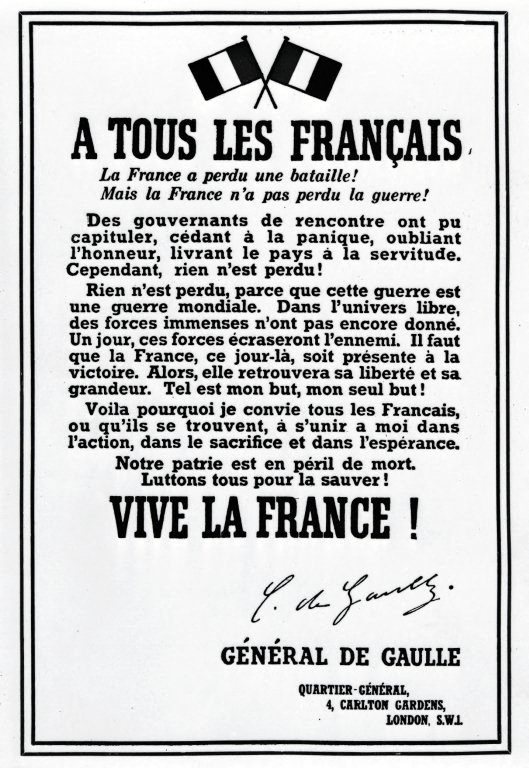5 things to know about Charles de Gaulle's historic 'appel du 18 juin'

In 1940, France's former president and then-General Charles de Gaulle recorded a historic speech that many consider the start of the French resistance during World War II. Here are some facts you may not know about it.
On June 18, 1940, then-General Charles de Gaulle spoke into a BBC microphone in London, proclaiming that "Whatever happens, the flame of the French resistance must not be extinguished and will not be extinguished."
His words were broadcast on the BBC's Radio Londres, the network's French language programme.
General de Gaulle called on all officers, soldiers and engineers already in British territory or capable of getting there, to join the fight against Nazi Germany
The speech is widely considered to be the "founding act of the Free French Forces" that would be led by de Gaulle.
De Gaulle had fled to UK the previous day, after Marshal Philippe Pétain, the new French prime minister, had promised to sign an armistice with Nazi Germany.
READ MORE: 'Punished for daring': Women journalists defied Allies to cover D-Day
Here are five facts about the famous speech;
It was actually a response to another speech - The previous day, on June 17th at 12:30pm, the new head of the French government, Marshal Philippe Pétain, made a speech announcing his plans to sign an armistice with Nazi Germany. De Gaulle fled France the same day, and met with British Prime Minister Winston Churchill who gave him the green light to record a speech.
There were not many listeners - In reality, de Gaulle's appeal on June 18th is not thought to have been heard by many French people. After the British government went back and forth about whether to air the speech, it eventually was broadcast at 10pm, rather late for people to have heard it across the Channel.
On top of that, the BBC would not have been a first choice for radio stations amongst French people, historian Aurélie Luneau told France Bleu.
Instead, the notoriety of the speech instead came from the word of mouth and re-prints of its words in the international press in the days to come. It was also put into poster-form and placed on walls around London.

A reproduction, from August 1940, of the poster put on walls around London, with the words of de Gaulle's June 18th speech (Photo by AFP)
But it did mobilise many French once they heard about it. One key example is the Isle de Sein, off the coast of Finistère in Brittany. The small fishing community mobilised, and from June 24th to 26th, 136 locals sailed to Britain, the youngest just 14 and the oldest 54.
No recording of the speech - As it was not widely listened to, the original speech made on June 18th was not recorded or filmed. However, de Gaulle repeated his message again on the radio again four days later (on June 22), and this one was recorded and more widely listened to.
The BBC then went on to give de Gaulle and the Free French five minutes a day to broadcast to France, in an effort to organise the resistance.
In 2023, French newspaper Le Monde was able to use artificial intelligence to recreate a close version to what de Gaulle's original speech may have sounded like.
De Gaulle's nickname - The General won the nickname 'L'Homme du 18 juin' (The man of the 18th of June) due to his initial speech and the many more that were broadcast during World War II.
Commemorated with a coin and stamp - Upon the 70th anniversary of the speech in 2010, France commemorated the event with a special stamp (you can see it here), as well as a €2 commemorative coin (you can see/buy it here).
Comments
See Also
On June 18, 1940, then-General Charles de Gaulle spoke into a BBC microphone in London, proclaiming that "Whatever happens, the flame of the French resistance must not be extinguished and will not be extinguished."
His words were broadcast on the BBC's Radio Londres, the network's French language programme.
General de Gaulle called on all officers, soldiers and engineers already in British territory or capable of getting there, to join the fight against Nazi Germany
The speech is widely considered to be the "founding act of the Free French Forces" that would be led by de Gaulle.
De Gaulle had fled to UK the previous day, after Marshal Philippe Pétain, the new French prime minister, had promised to sign an armistice with Nazi Germany.
READ MORE: 'Punished for daring': Women journalists defied Allies to cover D-Day
Here are five facts about the famous speech;
It was actually a response to another speech - The previous day, on June 17th at 12:30pm, the new head of the French government, Marshal Philippe Pétain, made a speech announcing his plans to sign an armistice with Nazi Germany. De Gaulle fled France the same day, and met with British Prime Minister Winston Churchill who gave him the green light to record a speech.
There were not many listeners - In reality, de Gaulle's appeal on June 18th is not thought to have been heard by many French people. After the British government went back and forth about whether to air the speech, it eventually was broadcast at 10pm, rather late for people to have heard it across the Channel.
On top of that, the BBC would not have been a first choice for radio stations amongst French people, historian Aurélie Luneau told France Bleu.
Instead, the notoriety of the speech instead came from the word of mouth and re-prints of its words in the international press in the days to come. It was also put into poster-form and placed on walls around London.

But it did mobilise many French once they heard about it. One key example is the Isle de Sein, off the coast of Finistère in Brittany. The small fishing community mobilised, and from June 24th to 26th, 136 locals sailed to Britain, the youngest just 14 and the oldest 54.
No recording of the speech - As it was not widely listened to, the original speech made on June 18th was not recorded or filmed. However, de Gaulle repeated his message again on the radio again four days later (on June 22), and this one was recorded and more widely listened to.
The BBC then went on to give de Gaulle and the Free French five minutes a day to broadcast to France, in an effort to organise the resistance.
In 2023, French newspaper Le Monde was able to use artificial intelligence to recreate a close version to what de Gaulle's original speech may have sounded like.
De Gaulle's nickname - The General won the nickname 'L'Homme du 18 juin' (The man of the 18th of June) due to his initial speech and the many more that were broadcast during World War II.
Commemorated with a coin and stamp - Upon the 70th anniversary of the speech in 2010, France commemorated the event with a special stamp (you can see it here), as well as a €2 commemorative coin (you can see/buy it here).
Join the conversation in our comments section below. Share your own views and experience and if you have a question or suggestion for our journalists then email us at [email protected].
Please keep comments civil, constructive and on topic – and make sure to read our terms of use before getting involved.
Please log in here to leave a comment.